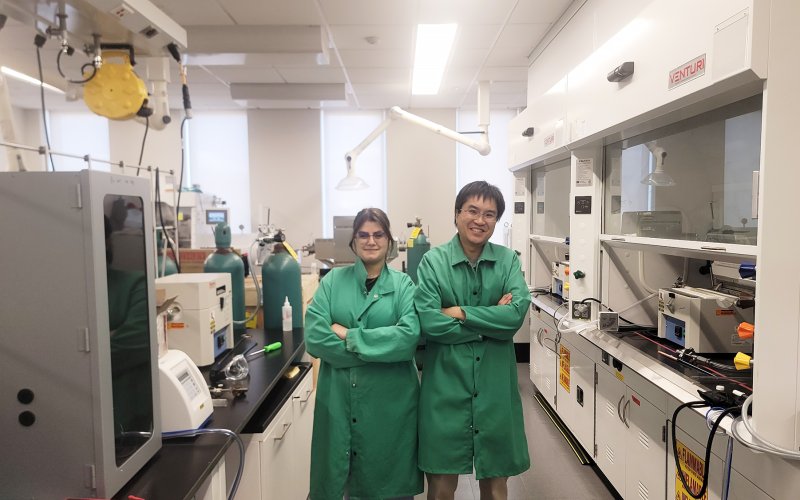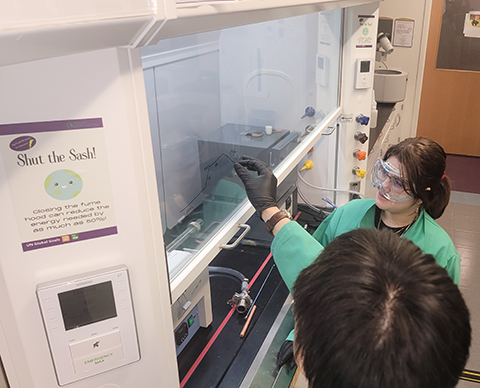Summer Research Program Fosters Hands-On Experience

ALBANY, N.Y. (July 30, 2024) — UAlbany junior Alma Kolakji is spending her summer trying to help make rocket fuel more environmentally friendly. She is among more than 40 students taking part in the College of Nanotechnology, Science, and Engineering (CNSE) Summer Undergraduate Research Program (SURP).
Born in Damascus, Syria, Kolakji was interested in STEM since her early childhood. Her parents would let her watch cartoons about science, such as Sid the Science Kid and Nina’s Science Lab. She also didn’t need to go far to find inspiration in her family.
“My grandfather was a pharmacist, so I would always read his books even though I wouldn’t understand them most of the time,” said Kolakji, an Honors College student who is in the honors chemistry program. “As I grew older, I began reading about scientists and how their research and discoveries basically changed the world. I knew I wanted to be mentioned in one of these books one day.”
In 2012, following the outbreak of civil war in Syria, Kolakji moved with her mother and sister to Jeddah, Saudi Arabia, while her father went to the United States to apply for asylum.
“Growing up (in Saudi Arabia) was nice but different from the United States,” continued Kolakji. “I was in an all-girls school that had strict rules. The educational system is also different as it’s a set schedule of classes, so the students don’t have choices. By the second year of high school, I had to decide whether to study natural/physical science or social science/ humanities, so classes became more concentrated on my choice, and I picked natural/physical science.”
By that time, in 2020, Kolakji’s family had been approved for asylum, so Alma, her sister and her mother moved to Clifton Park, N.Y., to be reunited with her father.

This summer, Kolakji is working in the lab of Assistant Professor of Chemistry Michael Yeung, alongside graduate student Joseph Doane on a project designing new boron fuels that could potentially serve as an alternative form of rocket fuel.
“The exploration of space requires new fuels. Earth is only a crib for humans, and the only way we can leave our nest is with better rockets. In the ideal case, you want a compound that burns energetically while being lightweight at the same time as your fuel,” said Yeung. “Boron is the best of both worlds, it burns with intense heat while being the fifth lightest element in the periodic table: the problem is that current boron fuels are difficult to store and are toxic.”
Kolakji and Doane are attempting to design new boron fuels whose state of matter is solid instead of liquid or gas. This will make it easy to store and prevent accidental human absorption.
“Moreover, we can target crystal structures that have a higher energy density than a gas which means that we can get more energy with only a slight increase in weight,” continued Yeung.
“The summer research experience with Dr. Yeung has been a blast. Dr. Yeung is very friendly and understanding and never leaves anything unexplained,” said Kolakji. “The research has also been a massive step in my academic journey. I’ve been involved in both hands-on experiments and calculations.”
Yeung is equally effusive in his praise of Kolakji’s enthusiasm.
“In our first meeting, I could tell that Alma is someone that will not let anything stop her from whatever she puts her mind to, and this can be seen in her research,” said Yeung. “The project that I gave her is admittedly a hard project, it’s why both she and Joseph work together on it, because it’s tough. And thanks to the SURP, this has given Alma the ability to reach her true potential. She’s there everyday — some days beating me to the lab — and is constantly coming up with ideas that rival experts in the field.”
SURP, initially developed about 10 years ago at what was then the College of Nanoscale Science and Engineering, expanded in 2024 to include all four departments in CNSE (Nanoscale Science and Engineering, Electrical and Computer Engineering, Computer Science and Environmental and Sustainable Engineering) as well as the Department of Chemistry in the College of Arts and Sciences (CAS).
“The Summer Undergraduate Research Program provides unparalleled opportunities for students to enhance their academic skills, learning and success; make intellectual and creative contributions to an academic discipline; learn about a specific field or career and develop competencies for future success; and collaborate with faculty, staff and students by exploring completely new areas of nanotechnology, science and engineering,” said CNSE Professor Robert Brainard, director of the SURP program.
Brainard noted that for this year, the program raised $168,000 to fund 24 positions, including $30,000 from industry partners. Program participants, as well as other students conducting research at CNSE this summer will take part in two poster presentations: one at the NY CREATES’ Albany NanoTech Complex on Aug. 1, and one at ETEC on Aug. 2.
For Kolakji, the poster presentation will be the next step in her journey toward what she hopes will be a PhD in chemistry.
“One of the things I wanted to accomplish this summer was to learn more about material chemistry. Now I’m rather certain that this is what I want to study (for my PhD)," said Kolakji. "I’m also learning how to use multiple instruments, as it’s a good skill to obtain in academics and careers. I also received first-hand experience on how an academic lab works, which will further prepare me for graduate school.”
The well-rounded Kolakji is also the incoming vice president of Fisheye Media (formally known as ATV).
“It’s a student media organization hosted at UAlbany that focuses on creating video production, podcasts and short movies,” she said. “It’s an excellent way to show the creative side of me.”
In addition to Kolakji, the following students are taking also part in the 2024 Summer Undergraduate Research Program:
- Ethan Reich (Universtiy of Colorado, Boulder), working with Rixiang Huang (Environmental and Sustainable Engineering)
- Conor Fryer (Union College), working with Aishwari Talhan (Electrical and Computer Engineering)
- Tessa Locke (Vassar College) working with Gregory Denbeaux (Nanoscale Science and Engineering)
From UAlbany:
Kelsey Classen, working with Jeremy Feldblyum (Chemistry)
Mahmood Al-Farsi, working with Yaoze Liu (ESE)
Uthkarsha Barua, working with Aynul Bari (ESE)
Andrew Kang and Kirit Bagepalli, working with Daphney-Stavroula Zois (ECE)
Justin Adams, working with Talhan (ECE)
Emma Clements, working with Carlo Cafaro (DNSE)
Jacob Blaylock, working with Walid Redjem (DNSE)
Besma El-Tilib, working with Brainard (DNSE)
William Walsh, working with Denbeaux (DNSE)
Anton Bonacci and Douglas MacLeod, working with Kathleen Dunn (DNSE)
Meghan Geraghty, working with J. Andres Melendez (DNSE)
Natalee Huli, working with Michael Fasullo (DNSE)
Hasan Merzai and Xiuxian Wu, working with Nathaniel Cady (DNSE)
Tianyu Zhu, working with Weilan Zhang (ESE)
- David Aduku and Theo Willis, working with Michael Phipps (Computer Science)




